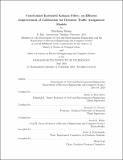| dc.contributor.advisor | Moshe E. Ben-Akiva and Francisco C. Pereira. | en_US |
| dc.contributor.author | Zhang, Haizheng, Ph. D. Massachusetts Institute of Technology | en_US |
| dc.contributor.other | Massachusetts Institute of Technology. Department of Electrical Engineering and Computer Science. | en_US |
| dc.date.accessioned | 2016-09-13T18:10:04Z | |
| dc.date.available | 2016-09-13T18:10:04Z | |
| dc.date.copyright | 2016 | en_US |
| dc.date.issued | 2016 | en_US |
| dc.identifier.uri | http://hdl.handle.net/1721.1/104148 | |
| dc.description | Thesis: S.M. in Transportation, Massachusetts Institute of Technology, Department of Civil and Environmental Engineering, 2016. | en_US |
| dc.description | Thesis: S.M., Massachusetts Institute of Technology, Department of Electrical Engineering and Computer Science, 2016. | en_US |
| dc.description | This electronic version was submitted by the student author. The certified thesis is available in the Institute Archives and Special Collections. | en_US |
| dc.description | Cataloged from student-submitted PDF version of thesis. | en_US |
| dc.description | Includes bibliographical references (pages 83-86). | en_US |
| dc.description.abstract | The calibration (estimation of inputs and parameters) for dynamic traffic assignment (DTA) systems is a crucial process for traffic prediction accuracy, and thus critical to global traffic management applications to reduce traffic congestion. In support of the real-time traffic management, the DTA calibration algorithm should also be online, in terms of: 1) estimating inputs and parameters in a time interval only based on data up to that time; 2) performing calibration faster than real-time data generation. Generalized least squares (GLS) methods and Kalman filter-based methods are proved useful in online calibration. However, in literature, the road networks selected to test online calibration algorithms are usually simple and have small number of parameters. Thus their effectiveness when applied to high dimensions and large networks is not well proved. In this thesis, we implemented the extended Kalman filter (EKF) and tested it on the Singapore expressway network with synthetic data that replicate real world demand level. The EKF is diverging and the DTA system is even worse than when no calibration is applied. The problem lies in the truncation process in DTA systems. When estimated demand values are negative, they are truncated to 0 and the overall demand is overestimated. To overcome this problem, this thesis presents a modified EKF method, called constrained EKF. Constrained EKF solves the problem of over-estimating the overall demand by imposing constraints on the posterior distribution of the state estimators and obtain the maximum a posteriori (MAP) estimates within the feasible region. An algorithm of iteratively adding equality constraints followed by the coordinate descent method is applied to obtain the MAP estimates. In our case study, this constrained EKF implementation added less than 10 seconds of computation time and improved EKF significantly. Results show that it also outperforms GLS, probably because its inherent covariance update procedure has an advantage of adapting changes compared to fixed covariance matrix setting in GLS. The contributions of this thesis include: 1) conducting online calibration algorithms on a large network with relatively high dimensional parameters, 2) identifying drawbacks of a widely applied solution for online DTA calibration in a large network, 3) improving an existing algorithm from non-convergence to great performance, 4) proposing an efficient and simple method for the improved algorithm, 5) attaining better performance than an existing benchmark algorithm. | en_US |
| dc.description.statementofresponsibility | by Haizheng Zhang. | en_US |
| dc.format.extent | 86 pages | en_US |
| dc.language.iso | eng | en_US |
| dc.publisher | Massachusetts Institute of Technology | en_US |
| dc.rights | M.I.T. theses are protected by copyright. They may be viewed from this source for any purpose, but reproduction or distribution in any format is prohibited without written permission. See provided URL for inquiries about permission. | en_US |
| dc.rights.uri | http://dspace.mit.edu/handle/1721.1/7582 | en_US |
| dc.subject | Civil and Environmental Engineering. | en_US |
| dc.subject | Electrical Engineering and Computer Science. | en_US |
| dc.title | Constrained extended Kalman filter : an efficient improvement of calibration for dynamic traffic assignment models | en_US |
| dc.title.alternative | Constrained EKF : an efficient improvement of calibration for DTA models | en_US |
| dc.type | Thesis | en_US |
| dc.description.degree | S.M. in Transportation | en_US |
| dc.description.degree | S.M. | en_US |
| dc.contributor.department | Massachusetts Institute of Technology. Department of Civil and Environmental Engineering | |
| dc.contributor.department | Massachusetts Institute of Technology. Department of Electrical Engineering and Computer Science | |
| dc.identifier.oclc | 958279022 | en_US |
